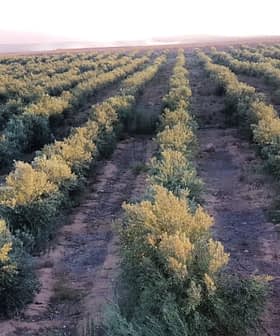There was no hesitation when Alfonso Swett, founder of Olisur, listed his company’s goals: “To produce excellent olive oil, fresh, new and high quality. That tastes good. An oil that is accepted worldwide.” In order to reach these goals Swett and his team at Olisur, a 5‑year old olive oil company based in Santiago, have mastered a process of harvesting olives at the peak of ripeness and processing them into extra virgin olive oil at their on-site mill within four hours (or less), capturing the fruit’s full, fresh flavor.
Taste is of ultimate importance to Swett, and the driving motivation behind the methods adopted by Olisur. With awards from international olive oil competitions in Canada, China, the USA and Italy over the past 3 years, it’s clear the approach Olisur has taken is working well.
Olisur is an estate olive grove 80 km south of Santiago, Chile, nestled between the Andes and the sea, in an area famous for its Mediterranean-like climate. The company uses a modern approach to a traditional industry, with high-density plantings, sustainable farming practices, mechanical harvesting and immediate processing in a state-of-the-art mill located nearby. Olisur markets ten different high quality, low-acidity olive oils, sold at competitive prices.
The dense planting of 900 plants per acre allows Olisur to achieve high yields from their newly planted 2,400 acres. This approach to planting is a dramatic change from traditional olive farming, which involves groves of tall trees harvested by gently shaking the olives into nets or plucking them by hand. In Olisur’s high density groves, the trees are much
shorter, and therefore easier to harvest using mechanical means.
The change in planting methods has proven extremely economical and effective. Last year Olisur produced 1.8 million litres of premium extra virgin olive oil. And this is just the beginning; the company has plans to plant 3000 more high-density acres in the next few years.
The Olisur team has developed a process that allows them to make fresh olive oil within 4 hours — usually closer to 2 hours — of harvesting. As a result of quickly harvesting at the peak of ripeness, the oil acidity in the resulting oil is low, just .2% (far below the maximum permissible acidity level of .8% for classification as extra virgin olive oil).
This success rate is all the more important considering that Olisur is a newcomer to the olive oil scene. Olisur founder Alfonso Swett became
interested in the olive oil business in 2001, after feeling inspired by a trip
to Spain. By tapping into the expert advice of top soil specialists, he soon realized the growing conditions for olives in Chile were as favorable as found in the Mediterranean areas. And so the dream ripened into reality; Olisur was officially founded in 2005.
An entrepreneur since the 60’s, Swett brought his extensive experience with industrial export business gleaned through years of berry farming in South Chile, and an interest in modern, sustainable methods to his new olive oil enterprise.
Swett says he’s very happy with with the progress Olisur has made to date, and pleased that they have successfully attained so many of their original business plan intentions. They are poised to expand into new
markets in the coming years. With 3,000 more acres in the pipeline, combined with a track record of consistently high quality, award-winning extra virgin olive oils at mid-range prices, Olisur’s capacity for export growth seems assured.
Almost all of the olive oil currently produced by Olisur (99%) is exported to Canada and the United States, with a promising sales start in Japanese markets. While happy with their current progress and products, Swett has his eye on new markets. “I think the olive oil industry is growing, as it should. Olive oil should be the only oil humans consume. Thousands of years and all the studies show the nutritional value of olive oil” Swett told Olive Oil Times. “Once people realize the importance of their health, they will use only olive oil, and enjoy the flavor.”
Achieving higher volume sales isn’t Swett’s only guiding business philosophy. “We must produce for other countries, and they request sustainability”, Swett explains when asked what has inspired his avant-garde business philosophy and facilities. One example of their sustainable practices is the grinding of pulp and olive pits to make fertilizer that is reapplied to the soil after harvesting, rejuvenating the soil while creating more work and jobs. The much publicized state-of-the-art and efficient buildings on the estate are further evidence of a commitment to social and environmental sustainability practices.
In general, Swett says he feels positive about the olive oil industry in Chile, and with the quality of products made by new producers in the region. Despite the fact that Chilean olive oil producers have not had a significant track record prior to the year 2000, he believes the recent increases in investment levels in Chilean olive oil companies will change that. “Chilean olive oil will be a major player in the future” Swett boldly states, adding that he believes that the many Chilean olive oil producers have invested the right amount to achieve high-quality results.
When asked about his favorite olive oil variety, Swett chuckles and says he loves them all and all the products he has ever produced. Otherwise, he wouldn’t be in the business, motivated to create such a successful olive oil enterprise, adapting new approaches to olive oil production that are nothing short of an industry revolution. And by doing so, Swett has shown he has a talent for bringing his dreams to reality and the ability to ripen an idea as his olives while serving as an inspiration for others in the industry.
.








